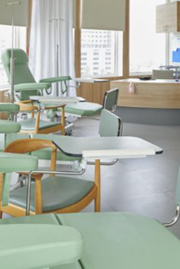
Lockdown worries bigger for those with chronic ailments
Posted 10 Apr 2020 | Source: Deccan Herald
The lockdown is proving particularly tough for people with disabilities and those undergoing dialysis and chemotherapy.
From procuring medicines, going to the hospital, and making sure the caregivers are free of infection, the challenges are aplenty.
HCG Cancer Hospital in Shantinagar sends an e-mail to patients which they can show to the police if they are questioned for travelling during the quarantine.
Safety measures such as thorough check-up before entering the premises and reducing the consultation time from 9 am to 5 pm, among others, are strictly followed.
For cancer patients, when procedures aren’t done in time, chances of survival come down and chances of developing infections are greater. It is particularly risky for patients to go to hospitals during a pandemic.
At Sri Shankara Cancer Foundation in Basavanagudi has 320 bed, tele-consulting is coming in useful. “It’s unsafe for the doctors to visit the patient and visa-versa. Wherever tele-consultation can be used, it’s the best option at the moment,” a spokesperson for the oncology department says.
In cases where treatments can be deferred, medical professionals are telling patients to stay home for the moment.
For patients who do need to come in, hospitals are encouraging calling and checking about the situation at the hospital before visiting.
Dr Swati Rajagopal, consultant, infectious diseases, Aster CMI, says dialysis patients are given time slots to avoid crowding.
Those undergoing chemotherapy and dialysis must remain indoors and not step out for grocery shopping. “If the caretakers develop a cold, cough and fever, they must report it to the doctor,” she says.
Dr Vidyashankar P, lead consultant, nephrology, says finding a commute is the biggest challenge for dialysis patients. “Ambulances are scarce and patients have to use private vehicles,” he says.
Double challenge
Among those facing the toughest challenges are people with disabilities, daily-wage earners, and those living alone.
“They face scarcity of funds, rations, medicines and essential items,” says Arman Ali, executive director, National Centre for Promotion of Employment for Disabled People.
“Disabilities such as thalassemia call for visits to the hospital for blood transfusion every 15 to 20 days. If this is not done in time, the risk of infection is high,” he says.
Because of the lockdown, blood donation camps are not being held and blood donors are not coming forward for fear of Covid-19 infection.
He says caregivers must have easy access to protective equipment such as masks, gloves and hand sanitisers. “They must be trained and informed about the risks,” he says.
Dependence on caregivers makes social distancing difficult, and thus it is important caregivers are adequately trained, he says.
amarthanam Trust for the Disabled has 106 visually impaired students with them. They have declared a holiday for the students but the representatives of the Trust regularly follow-up with the students and their families to check if they are following the lockdown rules, says Krishnaiah TM,programme head of the trust.
The Trust is also distributing food kits worth Rs 1,000 to the physically disabled, “Each kit has one kg rice, oil, atta, vegetables, soap and sanitisers. We have already distributed about 5,000 such kits. We are getting a few more ready,” adds Krishnaiah.
How to ease the pain
National Centre for Promotion of Employment for Disabled People offers suggestions on how to help people with disabilities get through these tough times.
* Provide financial compensation
* Allow flexible working hours and install assistive technologies at home
* Deliver rations, food, medicines
* Online counseling for them, families and caregivers
* Set aside time slot at stores for the disabled and the elderly
NGOs that help
These voluntary groups help patients make hospital visits
* Samarthanam Trust for the Disabled (9449864776)
* National Centre for Promotion of Employment for Disabled People (7303944839)
* Government health emergency helpline (9154153917/18/19)
